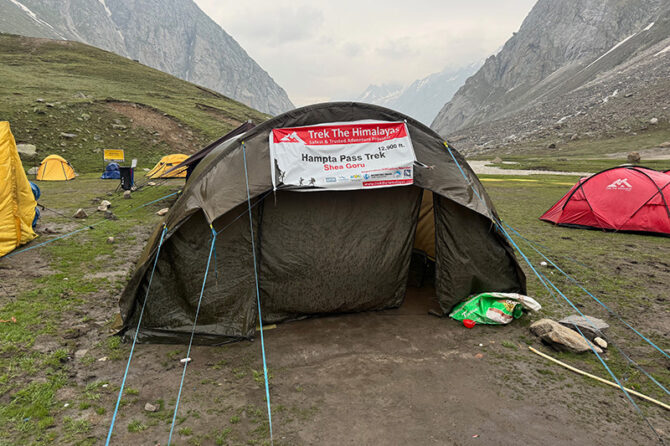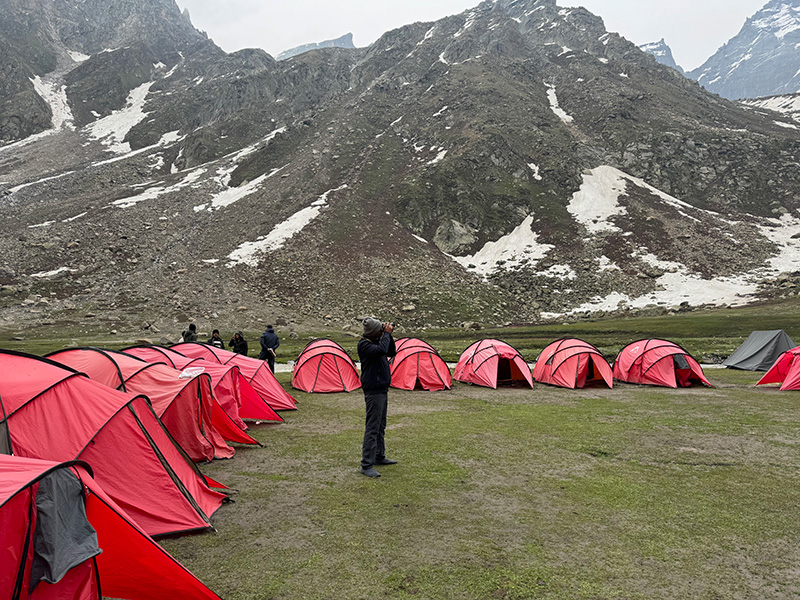
There are times in life when the simplest of happenings transmute to become our best teachers. For me, that finest of times was to sleep a freezing night in a tent, as I did, walking the Hampta Pass trek—5 days of trekking through belligerent valleys, unpredictable snow, and frozen Himalayan beauty. That paper-thin tent became a classroom, not just a place of shelter, which taught lessons that no text could provide.
1. Comfort Lies Beyond Discomfort
It was toughest first night. It was howling as if a beast was roaring, temperature went below freezing, and my body was sore due to the day’s ascend. When I zipped my sleeping bag and a strange cold seeped into my bone, I knew that to which extent Swami Vivekananda meant when he quoted, “Take risks in your life. If you win, you can lead; if you lose, you can guide.”
Entering that tent was to exiting out of comfort. But once I did adjust, the cold became a friend—it deepened the warmth inside. Life also works in the same manner. Becoming grows when we relinquish demand for comfort and begin to absorb challenge. As Himalayan winds challenge our tents, challenges challenge inner fabric.
2. The Sharing Power: “Two Blankets Are Warmer than One”
Living together in a small tent with a trekking partner taught the loveliest lesson of all: sharing is caring. We taught each other to time every movement—zipping the tent, giving each other space to fit in the backpacks, even to change clothes!
Ego melts in tightest space. The tent taught us that cooperation is not a choice but a matter of survival. Indian philosophy repeats the same truth in the form of Sanskrit phrase Vasudhaiva Kutumbakam — the world is one a family.
When my trekking partner shared his final energy bar at dawn, it came to my mind that, “Alone we can do so little; together we can do so much” by Helen Keller. In that snowy wilderness, we did not only happen to have a shared tent—- we shared humankind.
3. Simplicity Is the Ultimate Sophistication
In that little tent, every piece of kit was worth something. A torch became a treasure, a set of dry socks was a luxury, and a mouthful of hot soup was heaven. In a world that always expects more, a tent shows you the beauty of less.
When Mahatma Gandhi marched for miles with nothing to his name but a walking stick, he demonstrated that strength has nothing to do with ownership but in purpose. The lightweight, frugal tent cloth, soft and strong, was a metaphor for Gandhi’s philosophy of simplicity—lightweight, unpretentious, but unyielding.
I saw that night how much baggage we carry—physical, emotional, digital. Mountains murmured: Simplify, you shall be free.
4. Between Inside and Outside: A Thin Line
It was cozy inside the tent; it was freezing cold when we went out. There was a single shield—a piece of thin nylon—from the wind. It was amazing how something as thin as that could withstand so much.
Isn’t that how we inner resilience does? Mind, although intangible, protects it from storms of life. Lord Krishna in Bhagavad Gita stated, “For one who has conquered the mind, the mind is the best of friends; but for one who has failed to do so, it is the worst of enemies.”
The tent became a parable of the mind. Construct it strong—not with walls, but faith, discipline, and peace—and no storm can shake you.

5. Small Places Learn Great Things
Changing clothes in a tent is a comedy of contortions. Every movement was a yoga asana in action! But that little hassle taught humility. It broke the sense of entitling.
Amidst the immensity of the Himalayas, our tent reminded us how little we truly need to survive—and how much we take for granted in our daily lives.
There is a Japanese saying: “The bamboo that bends when it cannot resist, endures for a hundred years.” Living in that small space, bending and adapting, we found endurance. It isn’t stiffness, but flexibility, that’s the key to staying alive.
6. Security Is Within Yourself
As darkness increased, we heard the mountain wind howl, the sound of ice cracking in the distance, and the waterfall roaring. But nothing, no bug, no cold, no ferocious sound could get in. The tent—a lightweight, apparently fragile structure—remained tenacious.
It is there that understanding set in: that strength does not always loudly rage but occasionally gently perseveres. Like how the tent contained warmth inside, inner peace may contain fast just as well when the chaos lies out there.
This is the Buddhist philosophy: “Peace comes from within. Do not seek it without.” The tent became a metaphor for that inner refuge.
7. Appreciation in Every Breathing Muscle
When morning sunlight broke and snow sparkled like silver, relief did not first resonate in me, but gratitude—to tent, to sleeping bag, to shared laughter, to the experience.
We tend to express gratitude towards major acts, but trekking educates you to express gratitude towards the little things—the tent peg that didn’t give way, the zipper that didn’t stuck, the friend who stayed vigil when you slept.
As the American author Melody Beattie once stated, “Gratitude turns what we have into enough.” Gratitude makes a cold night become a memory of a warm feeling.
8. Life Is a Tent—Temporary but Meaningful
Maybe the greatest insight was seeing how a tent reflects life itself—transitory, unpredictable, yet extremely beautiful. It gets pitched, we stay in it for a little while, and we’re done, leaving behind a spotless campsite for the next fellow.
Indian philosophy refers to it as Anitya—the impermanence of life. It teaches it every day: snow melts, rivers change course, but still, life endures.
Remembering that you are going to die is the best way I know to avoid the trap of thinking you have something to lose. Living out of a tent, you see this reality—not out of fear, but out of liberty.
Final thoughts: The Tent Within
The trek to Hampta Pass was not just a trekking in the mountains, but a pilgrimage in the soul. The tent, simple and thin, was a metaphor for life—strong but fragile, cold in the out but warm in, plain but deep.
Life, in the end, has nothing to do with how large the house we reside in but how cozy we make it from the inside. Whether you are pitching a tent in a windy mountain or a house in a lively city, it’s how we end up living, loving, and sharing that really makes a difference.
Like lovely writings of Rabindranath Tagore, “Faith is the bird that feels the light and sings when the dawn is still dark.” In the dead silence of the Himalayas, lying wrapped in a sleeping bag, I heard that tune—and it echoes still when life gets chilly.
Dr. Prahlada N.B
MBBS (JJMMC), MS (PGIMER, Chandigarh).
MBA in Healthcare & Hospital Management (BITS, Pilani),
Postgraduate Certificate in Technology Leadership and Innovation (MIT, USA)
Executive Programme in Strategic Management (IIM, Lucknow)
Senior Management Programme in Healthcare Management (IIM, Kozhikode)
Advanced Certificate in AI for Digital Health and Imaging Program (IISc, Bengaluru).
Senior Professor and former Head,
Department of ENT-Head & Neck Surgery, Skull Base Surgery, Cochlear Implant Surgery.
Basaveshwara Medical College & Hospital, Chitradurga, Karnataka, India.
My Vision: I don’t want to be a genius. I want to be a person with a bundle of experience.
My Mission: Help others achieve their life’s objectives in my presence or absence!
My Values: Creating value for others.
Leave a reply
















Dear Dr. Prahlada N.B Sir,
Your article on "Lessons for Life from Living in a Tent: Reflections from the Hampta Pass Trek" is truly inspiring. The way you weave together the challenges of living in a tent with the profound life lessons learned is remarkable. Your experiences beautifully illustrate the importance of resilience, simplicity, and inner strength.
The eight lessons you shared, from finding comfort in discomfort to appreciating the little things in life, are invaluable. Your reflections on the tent as a metaphor for life, with its impermanence and unpredictability, resonated deeply. Your writing style is engaging, and the inclusion of philosophical quotes adds depth to the narrative.
Some key takeaways from your article include:
– *Embracing discomfort*: You highlighted the importance of stepping out of our comfort zones and embracing challenges, which helps us grow and become stronger.
– *The power of sharing*: Your experience with your trekking partner showed that sharing and cooperation are essential for survival and can lead to deeper connections.
– *Simplicity and gratitude*: You emphasized the value of appreciating the small things in life and finding joy in simplicity.
Your story is a testament to the transformative power of experiences and the lessons we can learn from them. Thank you for sharing your insights and inspiring others to reflect on their own lives.
Reply